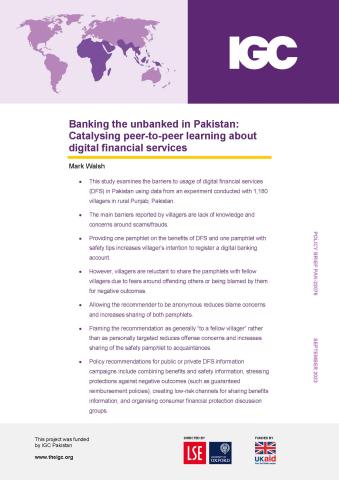Banking the unbanked in Pakistan: Catalysing peer-to-peer learning about digital financial services
This study examines the barriers to usage of digital financial services (DFS) in Pakistan using data from an experiment conducted with 1,180 villagers in rural Punjab, Pakistan.
-
Walsh Policy brief September 2023
PDF document • 212.84 KB
- The main barriers reported by villagers are lack of knowledge and concerns around scams/frauds.
- Providing one pamphlet on the benefits of DFS and one pamphlet with safety tips increases villager’s intention to register a digital banking account.
- However, villagers are reluctant to share the pamphlets with fellow villagers due to fears around offending others or being blamed by them for negative outcomes.
- Allowing the recommender to be anonymous reduces blame concerns and increases sharing of both pamphlets.
- Framing the recommendation as generally “to a fellow villager” rather than as personally targeted reduces offense concerns and increases sharing of the safety pamphlet to acquaintances.
- Policy recommendations for public or private DFS information campaigns include combining benefits and safety information, stressing protections against negative outcomes (such as guaranteed reimbursement policies), creating low-risk channels for sharing benefits information, and organising consumer financial protection discussion groups.



